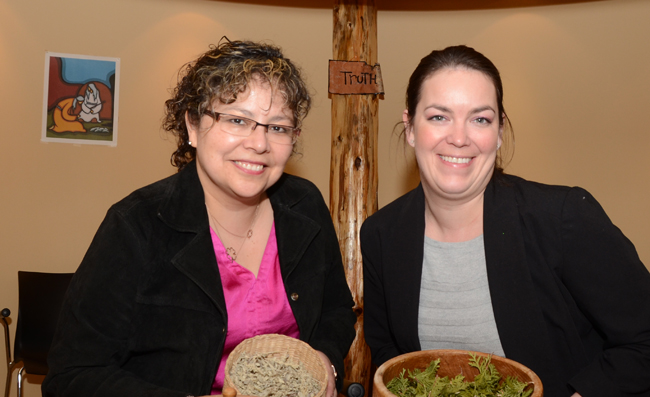Helping Native patients navigate cancer care system

By Norm Tollinsky
Northern Ontario Medical Journal Special to the Anishinabek News“Too often in the past,” says Alethea Kewayosh, director of Cancer Care Ontario’s (CCO) Aboriginal Cancer Control Unit, “First Nation, Inuit and Métis (FNIM) people have been on the outside looking in even when their own issues were being addressed.”
That’s not the case anymore though with the release of CCO’s Aboriginal Cancer Strategy II and the appointment of Regional Aboriginal Cancer Leads and Aboriginal Patient Navigators in 10 regional cancer programs across the province.
The Regional Aboriginal Cancer Leads and Aboriginal Patient Navigators promote access to timely cancer diagnosis and treatment and work to ensure seamless, co-ordinated care and services by assisting cancer patients and their families in navigating the health-care system.
Dr. Shannon Wesley, Regional Aboriginal Cancer Lead for the northwest, is a family doctor practicing with the Superior Family Health Organization in Thunder Bay. A member of the Eagle Lake First Nation near Dryden, Dr. Wesley earned her medical degree at the University of Minnesota and completed her family medicine residency training through the Northern Ontario School of Medicine’s Residents of the Canadian Shield (RoCS) program.
Dr. Wesley was appointed Aboriginal Cancer lead for the northwest in April 2013. Devoting one day per week to the role, she advocates for the region’s First Nation people to increase cancer screening and earlier diagnosis, and serves as a bridge between the northwest’s 25 Aboriginal health tables and the North West Regional Cancer Centre in Thunder Bay.
She promotes cancer screening and healthy lifestyles through a monthly radio show and newspaper articles in Wawatay News and makes presentations on the importance of cancer screening at Wequedong Lodge, a hostel for First Nation people visiting Thunder Bay for medical care.
Her counterpart in the northeast is Dr. Annelind Wakegijig, a family doctor with the Baawaating Family Health Team in Sault Ste. Marie, one of the few Aboriginal family health teams in the province. Originally from the Wikwemikong Unceded Indian Reserve on Manitoulin Island, Dr. Wakegijig is a graduate of the University of Alberta’s School of Medicine
Appointed Aboriginal Cancer Lead for the northeast last summer, Dr. Wakegijig sees herself as a facilitator for influencing the entire continuum of cancer care – from prevention and screening to diagnosis, treatment and palliative care.
“Screening in the general population is always a challenge, but it’s even more so for First Nation people due to isolation and mistrust,” she said. “But the message is starting to get out thanks to Cancer Care Ontario, the success of the under/never screened pilot projects and the Aboriginal Cancer Strategy.”
Cancer care for Aboriginal people became an issue 12 years ago when a landmark study by Cancer Care Ontario found alarming levels of colorectal and breast cancer in the First Nation, Inuit and Métis population. CCO established the Aboriginal Cancer Control Unit in 2000, unveiled its first five-year Aboriginal Cancer Strategy in 2004 and followed up with the current three-year Aboriginal Cancer Strategy II in 2012.
The thrust of the current strategy, explained Kewayosh, was to formalize the relationships with FNIM leadership.
With that accomplished, responsibility for execution has shifted to the Regional Cancer Programs, which are engaging with the First Nation, Inuit and Métis health tables to develop Aboriginal Cancer Plans at the local level.
Assisting the Regional Cancer Programs are the CCO-funded Aboriginal Patient Navigators, full-time, permanent staff now in place in Sudbury, Thunder Bay, Ottawa, Windsor, Barrie, London, Kingston, Oshawa, Hamilton and in the very near future, Toronto.
“First Nation groups we met with told us they were all in favour of education and screening, but told us, ‘We have people with cancer now. What is Cancer Care Ontario doing to address their needs?’” said Kewayosh.
“Patient Navigators are there to help First Nation, Inuit and Métis cancer patients find their way through the system and to help them access the care and support they need when they return to their community so they aren’t falling through the cracks.”
Sherri Baker, the Aboriginal Patient Navigator in the northeast, was born and raised in Sudbury, and traces her family’s origins to the Bear Island First Nation near Temagami.
Baker, who has a social work background, has been busy meeting with front line health-care workers in First Nation communities across the northeast to find out about their needs and the services they are able to offer cancer patients returning home following chemotherapy or radiation treatments.
At the North East Regional Cancer Centre, she helps patients apply for non-insured health benefits, makes sure they understand their diagnosis and treatment, and provides counselling and support to families and patients.
Performing the same role at the North West Regional Cancer Centre in Thunder Bay is Jeannie Simon, a member of the Nibinamik First Nation, a fly-in community 300 miles north of Thunder Bay.
Simon spent 10 years working as a community health representative in her home community and went on to complete a nursing program at Lakehead University in 2011.
In her role as an Aboriginal Patient Navigator, Simon greets First Nation cancer patients when they arrive at the North West Cancer Centre, visits with inpatients, advocates for them, provides translation services for patients whose first language is Ojibwe and Oji-Cree and provides support “so they don’t feel so alone and afraid.”
With the Aboriginal Cancer Strategy II set to run its course in 2015, Cancer Care Ontario is already in discussions to begin planning ahead for a third phase.
“We have come a long way and accomplished a lot in the last 10 years, but there is still much more work ahead of us to encourage healthier lifestyles, promote screening and reduce mortality from cancer in the First Nation, Inuit and Métis population of Ontario,” said Kewayosh.


